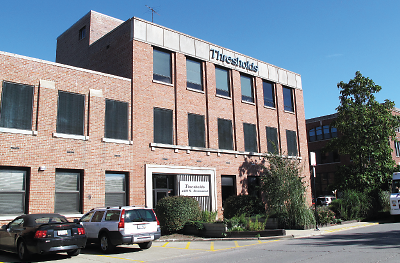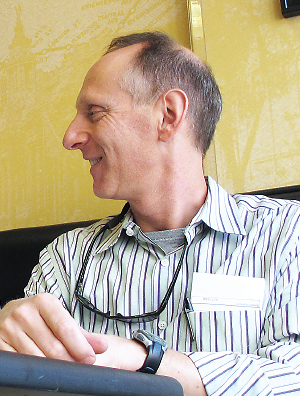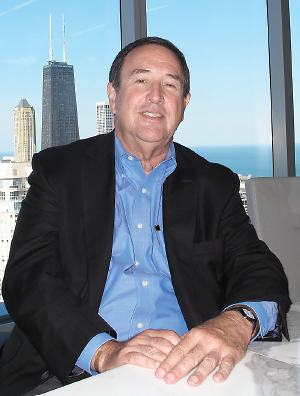Psychiatrist Helps the Overlooked Travel Path to Recovery
Abstract
Steven Weinstein, M.D., makes house calls as he practices recovery-focused psychiatry with some of Chicago’s poorest and most severely mentally ill individuals.
For Steven Weinstein, M.D., “recovery” means giving impoverished individuals with serious and persistent mental illness a leg up.

Thresholds, which is headquartered in northern Chicago, serves poor, seriously and persistently mentally ill individuals throughout the city.
Twice a week, as medical director of Thresholds, one of the oldest and largest psychosocial rehabilitation agencies in the United States, he gets his own legs moving to make that happen. He grabs his satchel with the paperwork and other items he needs, along with—as he puts it—“the principles and practice of recovery-oriented psychiatry,” and out the door he goes.
“I try to embody the principles of offering hope, showing acceptance, approaching people in a way that allows them to feel dignity and that shows them respect. I try to partner with my patients while also holding them accountable and emphasizing that it is their responsibility to make changes.”

Steven Weinstein, M.D., chats with a patient on his rounds of some of Chicago’s poorest neighborhoods. “Meds alone do not help such people build self-esteem or meaningful lives,” he says.
Weinstein then exits Thresholds’ headquarters, which is located in the Ravenswood neighborhood in northern Chicago; hops into his black Volvo; and heads off to pay house calls on patients. He makes these home visits as part of an Assertive Community Treatment (ACT) team that meets daily to discuss patients’ issues and successes. All members of this ACT team make such home visits.
Once Weinstein begins his round of house calls, he cruises throughout different neighborhoods looking for a parking spot, enters decrepit apartment buildings or flophouses, and knocks on doors to see whether patients are home. If they are home, it means finding out how they are doing, providing psychotropic medications or psychotropic-medication injections, or trying to convince them to take such medications.
On a recent crisp fall day, Weinstein visited “Don”—a patient with bipolar disorder. Don’s room was a disaster: spoiled food and soiled clothes were strewn everywhere, and cockroaches and bedbugs were evident. “Don’t sit down!” Weinstein whispered to this reporter, who had been invited to accompany him on his rounds.

Ronald Grais, a board member of Thresholds, helped it buy a flophouse from the city of Chicago for $1. It is now being converted into affordable apartments for poor, seriously mentally ill individuals.
Weinstein listened attentively as Don talked about his life. He talked to Don about taking psychotropic medications, but without success. “I think he enjoys these manic phases,” Weinstein lamented after the visit. (The good news, however, is that several weeks later, Weinstein reported that his efforts and those of his ACT team colleagues did pay off as Don agreed to take the medications.)
Weinstein then visited “Craig,” a bright young man who was taking a computer class in spite of his schizophrenia. Although Weinstein had placed Craig on high doses of an antipsychotic medication, Craig admitted that the demons in his mind were still tormenting him from time to time. “His is a heartbreaking situation, especially since he lives with family members who have little appreciation of his illness or of what he has to endure,” Weinstein later commented.
Then came a visit with “Ellie.” In spite of her bipolar disorder, she was managing to work part time in a fast-food restaurant, thanks to Thresholds’ supported-employment program. Weinstein relayed a message to Ellie from her boss: “If you stop hurrying so much in your work, your boss will let you work more hours.” Ellie said that she would try to slow down.
As the day moved on, Weinstein visited “Yolanda”—a 57-year-old woman with schizophrenia. In addition to giving her psychotropic medications, he inquired about her breathing and examined her legs for edema since she refuses to see any physician but him. He then accompanied her across the street to a Subway restaurant. There he bought her a sandwich, and the two of them sat at a table and chatted about her life, health, and financial situation.
She talked about growing up in southern Illinois, and Weinstein used his iPhone to show her the geography of that region, not just because he is keen on demonstrating his interest in his patients beyond symptom control, but because he wanted her to think about the path that had led her to Chicago. Finally, as he accompanied her back to her apartment building, he observed, “It looks as if you need some new pants without holes in them. I think our ACT team can get some for you.”
“That would be nice,” she said.
As Weinstein headed back to Thresholds after a day of making house calls, he admitted that he felt somewhat fatigued mentally and emotionally. His wife had once asked him, “How can you stand doing such grim work?”
“Grim? I don’t find it grim,” he replied. “I find it enormously rewarding.” ■
What are several of the most important things that psychiatrists can do to promote recovery in their seriously mentally ill patients? Weinstein addresses this question in a video interview posted at http://www.youtube.com/my_videos_edit?ns=1&video_id=iYWbBLsTE0A.
“Recovery from serious and persistent mental illness—notably schizophrenia, schizoaffective disorder, bipolar disorder, or major depression—is not the same as recovery from a [physical] illness,” Steven Weinstein, M.D., medical director of Thresholds, explained during a recent interview. “It is more of a process, of having people look at their lives and think about what they’d like to do differently and then making changes in that direction—say, taking steps to reduce drug use, going to school, or getting more involved in the community as a regular citizen. Our message is, ‘You can have a meaningful life in spite of your illness.’ ”
To help patients toward this end, Thresholds offers them myriad psychosocial services—for instance, Assertive Community Treatment (ACT) team visits to their homes, dual-diagnosis treatment, integrated mental and general medical care clinics, smoking-cessation programs, and programs directed at mothers, adolescents, and veterans.
Thresholds also offers outreach to the homeless who are seriously and persistently mentally ill. “We have teams—mobile units—who go out and ride the train lines to places where the homeless folks hang out,” Emily Moen, director of public relations at Thresholds, told Psychiatric News. “They do that over and over again, recognizing that the incidence of severe mental illness among people who are homeless is very high. It takes a lot of engagement and a lot of visits before we can get them into our services.” And sometimes psychiatry residents accompany them on their rounds.
Of all Thresholds’ services, the supported-employment program is his favorite, Weinstein admitted. “Even though many of our clients/patients have cognitive deficits and experience auditory hallucinations, and even though most do not even have a high-school education, some have made amazing changes in their lives once they started thinking about how it would feel to work in their community and earn a paycheck. Of the 645 clients/patients served by the supported-employment program in 2011, more than a third obtained jobs.
“On any given day,” Weinstein pointed out, “we at Thresholds serve about 3,000 people. Some receive intensive daily services, others receive monthly or weekly services. We served over 6,000 people last year. We have over 900 staff members, and that includes some 600 staff members who are doing clinical work. We have three child psychiatrists and eight adult psychiatrists who work for us on a contract basis. There are two of us psychiatrists full time, and we are trying to hire another. We are growing.”
Ronald Grais is a Chicago lawyer who works in a skyscraper in downtown Chicago. For 30 years, he has been a board member of Thresholds. He and Thresholds CEO Mark Ishaug discussed Thresholds’ financial operation and future in an interview with Psychiatric News.
“Our annual budget is over $50 million,” Ishaug said. “We get some fees through our housing programs and raise maybe [between] $3 million and $5 million a year through private sources—foundations, corporations, and individuals. But much of our resources comes from Medicaid. We used to serve a broader population when the state provided money for non-Medicaid-eligible people. But they cut those grants. So we are now more dependent on Medicaid than we ever have been for our survival.”
In preparation for the Affordable Care Act, Ishaug continued, Illinois is planning to enroll some 500,000 newly eligible Medicaid recipients over the next couple of years. And Thresholds is positioning itself to become one of the principal providers for the new Medicaid recipients who have serious and persistent mental illness. Moreover, Thresholds is planning on becoming a “health home” for the thousands of people it serves. “This means that we need to think in a much more holistic, care-coordination kind of way,” he said.
Still unresolved, though, he said, “is how we will get paid under the new Affordable Care Act.” Under the act, Thresholds will have to demonstrate that the services it provides reduce hospitalizations and improve outcomes. “That will be a huge challenge,” he said, “because even though we already increase health outcomes and reduce hospitalizations, we’ll need to adapt our service model to a new payment system and a new model.”
But during the next year, Grais said, Thresholds will be creating more partnerships with other mental health and general medical providers, which should help mold Thresholds into a health home for its thousands of patients.
Thresholds has already built some 1,000 units of supportive housing and is trying to increase that number, Grais said. For instance, he recently helped Thresholds purchase an old hotel—“a terrible place”—from the city of Chicago for $1. “We are now converting it into affordable apartments with money from different sources,” he said.
“So all in all, it is a scary, but exciting time for Thresholds,” Ishaug concluded. “What you are seeing today is only a glimpse of what we are going to be.”



